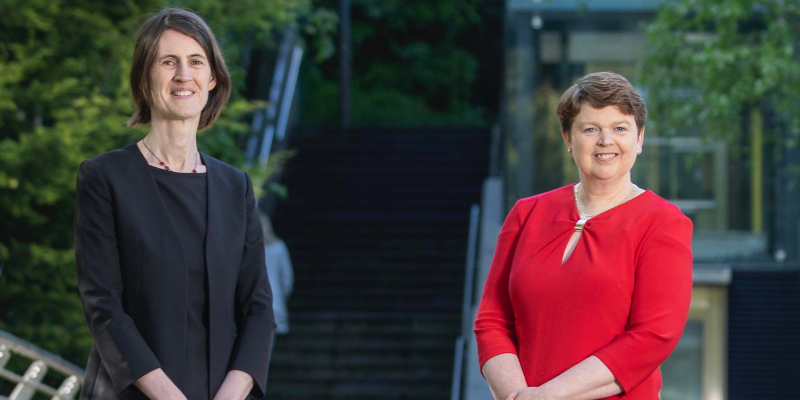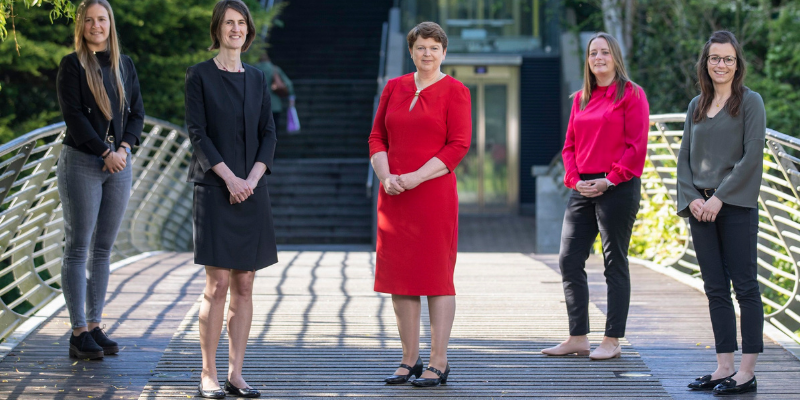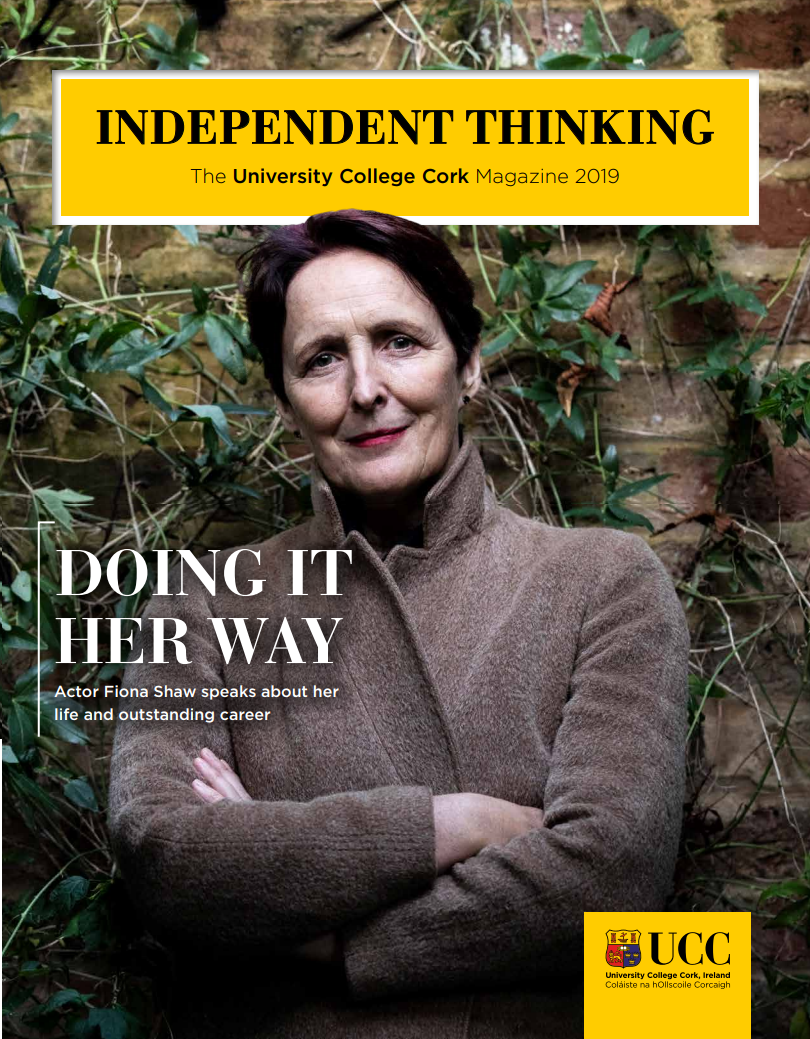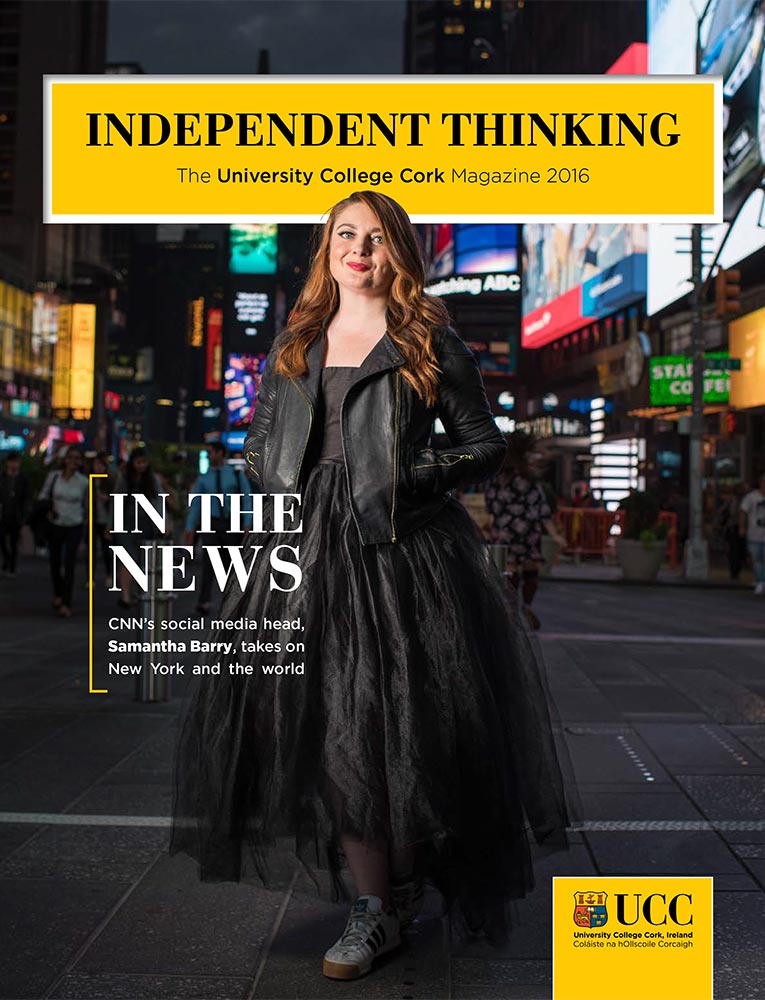Features
- Life beyond cancer
- Neil O'Leary, Chair of Cork University Foundation, on a successful career and what motivates him to support UCC today
- A point in time: coastal Atlas will serve as ‘a record for our grandchildren’
- Coming up for air: the sport of the novel for Eimear Ryan
- Sprinting forward
- A welcome return
- Time for positive change
- UCC students and alumni shine on the biggest sporting stage
- Adapting to the current
- It takes two
- Climate change requires transformative social action
- Bridging the gap
Life beyond cancer
Marjorie Brennan speaks with Professor Roisín Connolly and Professor Josephine Hegarty about a new study aiming to improve quality of life for women following treatment for breast and gynaecological cancers.
When Liz Casey completed her treatment for stage 2 breast cancer towards the end of 2015, she was relieved and grateful. However, she struggled to deal with the lingering effects of her diagnosis and treatment.
“I thought, naively, that after the treatment finished, things would go back to normal,” says the Australian now living and working in Cork. But the mental and physical side-effects of the treatment meant life did not return to normal for Liz for quite a long time.
“Things like brain fog and memory loss really affected me, and also the fatigue was debilitating. It was pretty much two to three years before I was back to normal in that regard. Also, the psychological impact is huge, and I totally underestimated that side of it. We get into this whole mindset when we are faced with something like this to get better physically. I certainly forgot about the mental effect and didn’t realise until I had gone back to work how much of a toll it had taken on me.”
In her role as a patient advocate, Liz is now involved with the LYSA (Linking You to Support and Advice) study, which aims to improve quality of life for women following treatment for breast and gynaecological cancers. The study is part of the Women’s Health Initiative, a two-year pilot scheme, supported by the Irish Cancer Society and Breakthrough Cancer Research, which involves the establishment of cancer survivorship clinics in Cork and Dublin. It is hoped the initiative will eventually lead to the roll-out of a national programme for cancer survivors.
Liz says she would have greatly appreciated such targeted support post-treatment: “This programme would have been so helpful had it been available when I had finished my treatment, and I know other women who felt very lonely during that process as well.”

The LYSA study is led by principal investigator Professor Roisín Connolly, Chair in Cancer Research at UCC, with co-principal investigator Professor Josephine Hegarty, Head of School of Nursing and Midwifery, UCC. It will work with women at Cork University Hospital (CUH) and regional hospitals who have completed their primary cancer therapy. The trial began last March and will have an eventual expected cohort of 200.
Roisín says that in her clinical practice as a medical oncologist at CUH, she has seen how women can often struggle to cope after the acute phase of treatment is completed.
“Some people find that transition very difficult because they were so supported during treatment, they were on a rollercoaster being told what to do, where to be, and who to call, and then suddenly they’re in this follow-up phase where they’re moved to a much more intermittent schedule. So, when we’re seeing them, we’re checking in quickly, and sometimes people don’t bring up all the things that are bothering them. And then, in between visits, they’re not sure whether they should be saying anything or not.”
According to Josephine, because of the nature of the treatment – be it chemotherapy, radiotherapy or hormone therapy – women are often living with lingering side-effects and symptoms.
“There have been leaps and bounds in what we can do in terms of survival. However, a large portion of women do have some symptoms after treatment and some of them can impact on quality of life, and their ability to engage in normal daily activities. For example, they may have lymphedema, chronic fatigue, or maybe sexual health issues. There might be issues with fertility, menopausal symptoms or incontinence.”
"Women deserve more because it could be me, it could be you, it could be your mother, and we should be doing as much as we can to just make life easier for people” - Professor Roisín Connolly
While the majority of the patients in the study have breast cancer, it is also enrolling patients with cervical cancer and endometrial cancer. The nurse-led clinic will look at the feasibility of collecting data routinely from women through online surveys.
“Those surveys ask about all of the different types of symptoms and issues that occur – it could be the fear of cancer occurrence, for example. If those are particularly problematic for the woman at that time, we can call back and provide some information over the phone or a referral to another pathway. It is about providing person-centred support that is based on their need at that time,” says Josephine.
For Liz, one of the difficulties after treatment was that because she looked better, people thought she was back to normal.
“I looked physically fine. People would say to me ‘oh, you look great’, but I wasn’t feeling great. All I wanted was for someone to say ‘you look terrible’, because then I could have gone, ‘well, I feel terrible’. But you don’t want to impart all of that on to people all the time.”
Roisín echoes this point and says continued support for those living with and beyond a cancer diagnosis is hugely important in helping them achieve a better quality of life.
“Some of these women have young children, they’re trying to manage school, childcare and co-ordinate all their activities – they’re not quite feeling themselves, they’re fatigued and everyone is saying ‘isn’t it great you’re through your treatment, you should be fine now’. But there can be emotional issues, such as the fear of the cancer coming back – which is a big thing; some people will have depression and anxiety that might be heightened by their treatment or by the fact that they’ve been diagnosed. People sometimes just don’t feel themselves, it can impact their ability to go back to work or maintain their prior level of activity and functioning. That’s where the whole area of survivorship comes in – to make sure that a patient’s quality of life is optimised and their symptoms are identified and managed as best we can.”

According to Roisín, even just knowing someone is there to acknowledge their issues can be a vital psychological boost to women.
“Sometimes just saying out loud what they’re feeling makes them feel better. We also feel it’s very important for us to be linking in with community services, such as Cork ARC Cancer Support House, who have been very supportive of this project, and the Daffodil nurses from the Irish Cancer Society who are on the ground in CUH.”
While the pandemic and the cyber-attack slowed down initial recruitment to the study, enrolment is now gathering pace. The study is being overseen by a research nurse and also includes funding for a dietitian with support from local charity Breakthrough Cancer Research, to offer advice on nutritional issues. It is hoped that these initial supports provided under the study can be extended in the long term.
“The National Cancer Strategy would suggest that cancer survivorship, just like clinical trials, should be part of the care of every patient coming through but it just hasn’t been funded,” says Roisín.
"My goal is to have optimally resourced cancer services and dedicated infrastructure available as routine for all of my patients and those across our region. Women deserve to have the best care and support possible because it could be me, it could be you, it could be your mother suffering from breast cancer. We should be doing as much as we can to just make life easier for people living with and beyond this diagnosis of cancer.”
Photography: Clare Keogh



